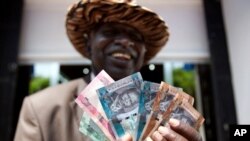Twenty-four hours after President Salva Kiir signed a peace deal for South Sudan, the young nation's currency was surging in value against the U.S. dollar.
Black market money changers in the national capital, Juba, were selling the South Sudanese Pound (SSP) at a rate of 10 SSP to the dollar Thursday. Two days earlier -- before Mr. Kiir signed the ageement -- the black market rate was 16 SSP to the dollar.
Most South Sudanese buy and sell currency on the black market. The official exchange rate for the South Sudanese Pound has remained at around 3 SSP to the dollar throughout South Sudan's 20-month crisis but that rate is only available to a few businesses and elites.
Amule Peter buys and sells currency on the black market in Wau, the capital of Western Bahr el Ghazal state. He saw a sharp increase in the number of customers trying to get rid of dollars in the hours immediately following the signature of the peace deal by Mr. Kiir.
National pride
Peter says the dollar sell-off was driven by national pride.
"There is a great change within these two days as people are proud of the peace,” he said.
Juba currency dealer John Mariak says the South Sudanese pound began gaining strength against the dollar immediately after it was announced that President Kiir had signed the peace deal.
He also thinks the pound is gaining ground because of the peace agreement.
The value of almost everything in South Sudan is affected by the dollar exchange rate because most consumer goods are imported and paid for in the U.S. currency. When the dollar gets stronger, as it has in the past year, the price of goods in South Sudan goes up; when it gets weaker, they go down.
But in the Jonglei state capital, Bor, merchant Ismahil Mukuaim says even though the pound is gaining value against the dollar, many items are still too expensive for ordinary South Sudanese to buy.
Mukuaim says ordinary people won't start to feel the benefits of the strengthening pound until the exchange rate reaches around 10 SSP to $1.
But back in Wau, trader Ishag Yahiya Hussein says there's something far more important than the strengthening pound, and that is the fact that South Sudan’s leaders have finally signed an agreement to end 20 months of fighting.
That, says Yahiya, is priceless.




